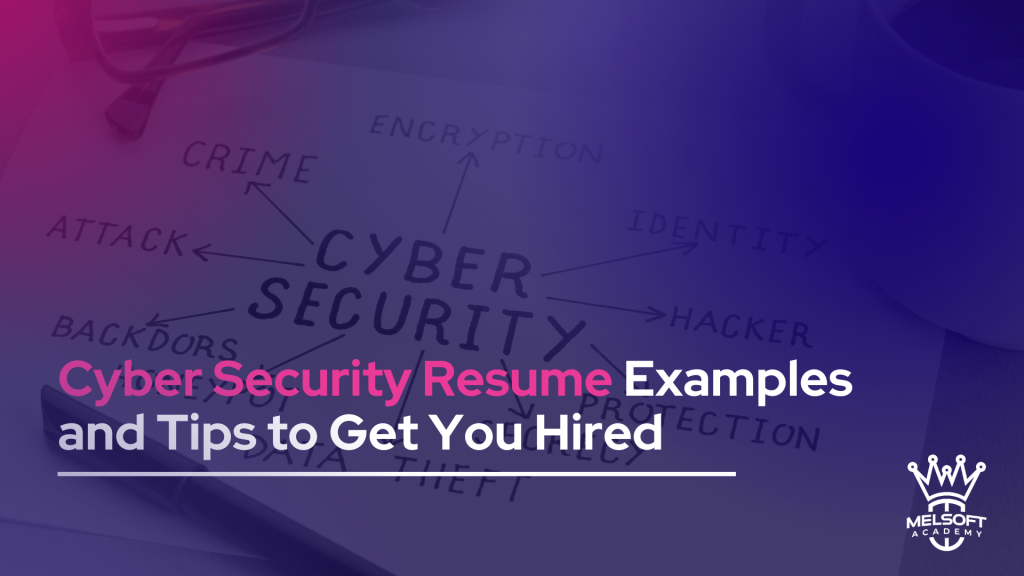Online security is becoming increasingly crucial for both corporations and individuals. The cybersecurity industry has grown in tandem with this rising concern. According to the U.S. Bureau of Labor Statistics, the job prospects for Information Security Analysts alone are growing at an impressive 33%, significantly higher than the average. With more cybersecurity jobs available than ever before, competition for these roles is fierce.
Your cybersecurity resume can be your key to unlocking a career in this dynamic and ever-evolving field. This guide will break down the essential components of a compelling cybersecurity resume, helping you stand out from the crowd.
Why is a Cyber Security Resume So Important?
Recruiters in the technology industry often review your LinkedIn, social media profiles, and even your Github portfolio. However, a strong resume is the gateway to these further screenings. It’s your first impression, and it needs to capture attention and highlight your suitability for the role.
Cybersecurity roles often involve access to sensitive data, making trust a paramount factor for employers. Your resume serves as an initial opportunity to establish that trust and demonstrate your commitment to security.
Benefits of a Strong Cyber Security Resume:
- Increased Interview Chances: Cybersecurity is a highly competitive field, and a strong resume is essential for securing an interview. A well-crafted resume that showcases your skills and experience significantly improves your chances of being selected.
- Enhanced Salary Negotiation: A compelling resume can give you leverage during salary negotiations. When hiring managers see that you possess the skills and experience they seek, they are more likely to offer a competitive salary.
- Access to Senior Positions: As you gain experience, a strong resume can open doors to more senior roles. It serves as a platform to demonstrate your skills and accomplishments to potential employers.
- Increased Credibility and Professionalism: A well-written and professional resume conveys seriousness about your career and demonstrates your preparedness for the job search. This can enhance your credibility and make you more attractive to employers.
- Boosted Confidence: A strong resume can boost your confidence. Knowing that you have a document that effectively highlights your cybersecurity skills and experience can strengthen your belief in your ability to land the job you desire.
- Standing Out from the Competition: Cybersecurity is a competitive field, and a strong resume is a powerful tool to differentiate yourself. By showcasing your skills, experience, and achievements, you can effectively demonstrate why you are the ideal candidate for the role.
What Do Hiring Managers Look For in Your Cybersecurity Resume?
Hiring managers are seeking candidates who demonstrate a strong foundation in the following areas:
- Cybersecurity Technical Skills: Most cybersecurity jobs require robust technical expertise. Highlight skills such as network forensics, intrusion detection, malware analysis, vulnerability assessment, database security, and penetration testing. Your resume should demonstrate your ability to identify and mitigate security threats. Carefully analyze the job description and tailor your skills to match their requirements.
- Information Security Expertise: Showcase your knowledge and experience in information security, including understanding security vulnerabilities and cyber risks, implementing security measures, and safeguarding sensitive data. Familiarity with industry-standard security frameworks and compliance regulations is highly valued, even for entry-level positions. Mention any experience with cybersecurity audits or handling security breaches.
- Cybersecurity Certifications: Certifications like Certified Ethical Hacker (CEH), Certified Information Systems Security (CISS), Offensive Security Certified Professional (OSCP), or other relevant certifications validate your expertise in specific areas of cybersecurity. They enhance your credibility and demonstrate your value to a cybersecurity team.
- Cybersecurity Experience: Showcase your relevant experience in the field, highlighting specific projects, achievements, and outcomes. This could include incident response, malware analysis, security architecture design, policy development, implementing security controls, cloud security, or any other relevant experience.
- Education and Qualifications: Include your educational background in information security and technology, especially if it includes a degree in computer science, information technology, or a related field. Mention any additional certifications, training, or workshops you have completed to stay up-to-date on the latest trends and technologies in cybersecurity.
- Understanding of Cybersecurity Risks: Demonstrate your knowledge of current and emerging security threats, such as cyberattacks, malware, social engineering, and insider threats. Showcase your ability to proactively identify and mitigate potential risks.
- Experience with Security Tools and Software: Mention any experience you have with cybersecurity software, intrusion detection systems, firewalls, encryption technologies, or other relevant tools commonly used in the cybersecurity industry.
- Penetration Testing Skills: Highlight your experience in conducting penetration tests to identify vulnerabilities and assess the overall security posture of systems and networks. Emphasize your ability to think like a hacker to uncover potential weaknesses.
- Awareness of Security Policies and Compliance: Showcase your understanding of industry-specific cybersecurity standards, regulations, and best practices. This could include knowledge of frameworks like ISO 27001, NIST, GDPR, or HIPAA.
Remember to tailor your resume to each job application, highlighting the skills and qualifications that align with the specific job requirements. Use bullet points to clearly present your skills and experience, making it easy for the hiring manager to identify your strengths. Even if you don’t get a specific job, your resume will be kept in the company’s applicant tracking systems, increasing your chances for future opportunities.
What Should You Include in Your Cybersecurity Resume?
Let’s examine a cybersecurity resume example to guide you:
1. Name & Contact Information:
Since cybersecurity roles often involve sensitive data, companies prioritize verifying your identity. Ensure your resume uses the same name as your other IDs.
Include your phone number and email address, as these are the preferred communication channels for most recruiters.
Adding a link to your LinkedIn profile is also crucial. Hiring managers use LinkedIn to corroborate information on your resume and verify your professional profile.
2. Education:
List the accredited colleges you’ve attended, including your tenure.
Highlight relevant coursework, such as information security, information risk management, network security, and penetration testing. This demonstrates your academic understanding of these topics.
3. Skills:
Organize your skills into three categories for better readability:
- Cybersecurity Techniques: Include skills like penetration testing, reverse engineering, encryption, and incident response.
- Cybersecurity Domains: If you specialize in areas like data center security, cloud forensics, or operational resilience, list them here.
- Cybersecurity Tools: Mention specific tools like Syxsense, Netsparker, and Acunetix if required for the job.
You can also include relevant soft skills, such as critical thinking, accountability, and collaboration, especially if mentioned in the job description.
4. Certifications:
Certifications are valuable in cybersecurity, as they often carry more weight than a four-year degree.
Certifications serve two main purposes:
- Specialized Knowledge: They provide a structured path to understanding a specific domain within cybersecurity, such as penetration testing and white hat hacking (CEH).
- Quick Skill Assessment: They allow hiring managers to quickly assess your skills. A CEH certification, for example, instantly indicates your competence in vulnerabilities and systems security.
List your certifications, including the name, certifying authority, completion dates, and any distinctions or grades achieved.
5. Employment History:
Existing cybersecurity experience is highly valuable. It demonstrates both your interest in the field and your ability to deliver on projects.
List your previous jobs in reverse chronological order, including company name, location, job title, tenure, and your most significant contributions.
Quantify your achievements whenever possible. Connect your work to the company’s gains. Instead of saying “built a DNS zone audit system,” state “built a DNS zone audit system, reducing DNS attacks by 25%.” This shows your understanding of how your skills contribute to an organization’s cybersecurity goals.
6. Projects:
Personal or passion projects in cybersecurity are valuable additions to your resume. Include details about what you created and its purpose. Examples include text encryption tools, keyloggers, network traffic auditing tools, and image encryption software.
You can also mention projects where you built security features within applications whose core focus wasn’t security. For instance, if you built a password analyzer for a social media app, highlight this and the skills you used.
Open source contributions to cybersecurity projects on Github are also worth mentioning, including the project’s name, purpose, and your specific contribution.
7. Awards:
Awards indicate a high level of skill in a cybersecurity discipline. Mention any awards you have received, including details about the project, skills used, problem solved, and results achieved.
Cyber Security Resume Samples Based on Career Stage
Here are a few examples of real cybersecurity resumes. We’re going to analyze each cyber security resume example to get an idea of what the good ones are made up of.
Entry-Level Cyber Security Resume Sample
What To Include
- If you have any job experience in the cybersecurity industry, then mention that first. If not, start with your academic history.
- List college coursework that you’ve taken that is related to cybersecurity. Any subjects related to systems security, networks, and data protection are worth mentioning here.
- At this stage, any online courses or bootcamps that you’ve taken can also come in handy, so include those under the certifications section of your resume.
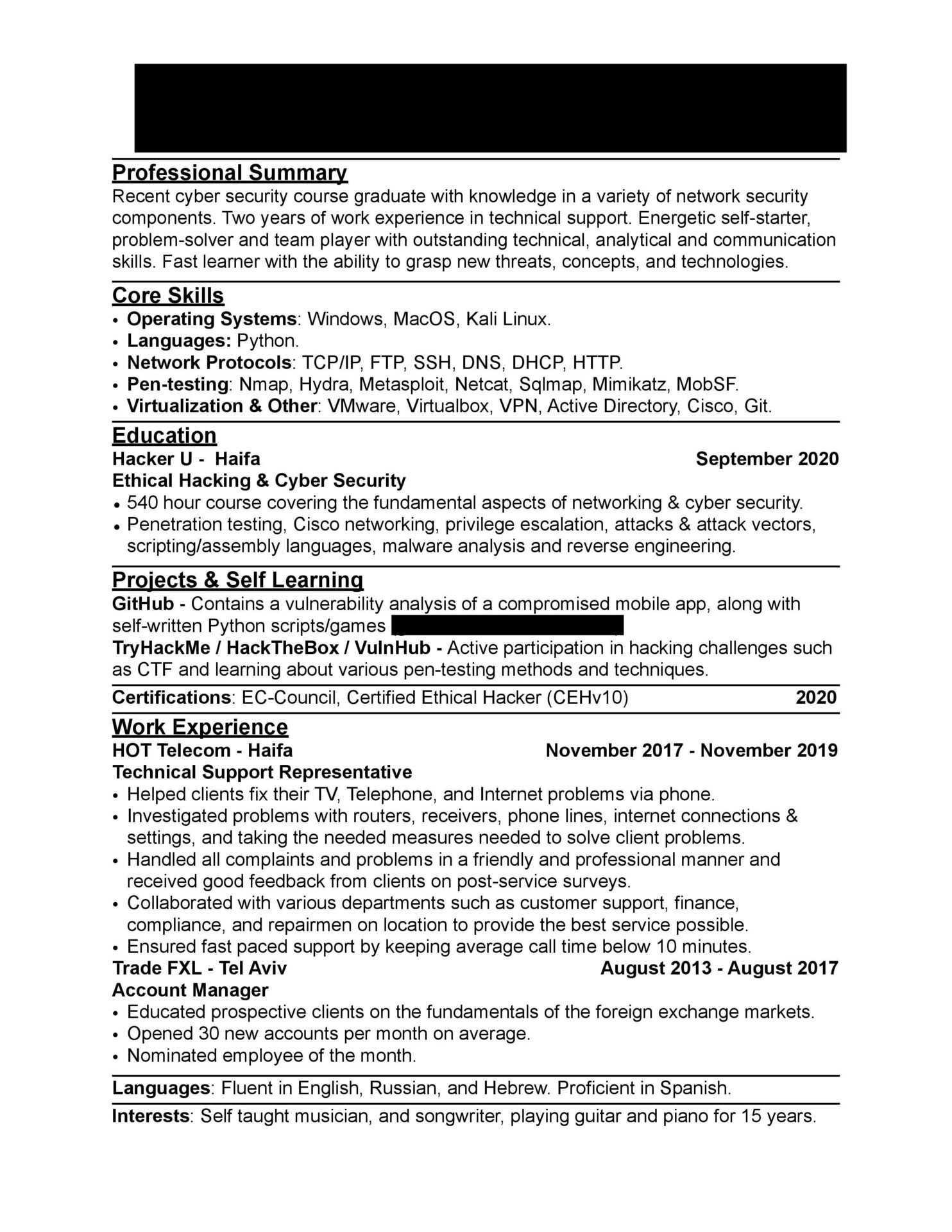
Source: Reddit
This cybersecurity resume has a lot of the right content for an entry-level role but could be structured better.
The first thing we notice is that the candidate’s education is mentioned before their work experience. That’s a big no-no and those two sections should be swapped. Cybersecurity engineers who have worked in the industry should always mention their employment history before their academic history because that carries more weight to recruiters.
We also see that the candidate’s certification is relegated to a single line between the sections about the languages they speak and personal interests. The right thing would be to put the certification in its own section after the one on education. There should also be more information on what the subjects covered in the certification and if relevant, the grading the candidate achieved in it.
Senior Cybersecurity Resume
What To Include
- Put the section on your employment history at the very top of your resume. When you’re a senior cybersecurity professional, that’s the information that matters most.
- Highlight certifications that you’ve completed in the domain. Recruiters like when cybersecurity engineers take the time to get certified in a particular discipline and recertify when the time comes.
- Flesh out your employment history by detailing how your work has contributed to previous companies’ goals. Quantify this information as much as possible, in terms of things like penetration tests completed, network throughput, system recovery times, and so on.
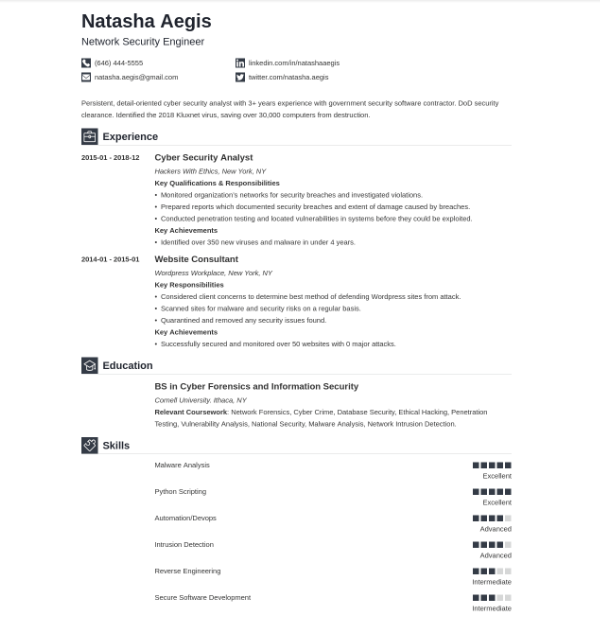
Source: Zety
Here we have a simple, well-formatted cybersecurity resume for a senior role. The candidate starts with their employment history and then moves on to education and skills, which is exactly what you want to do.
Within the employment history, we see the information broken down into responsibilities and achievements. This is a good way to articulate details on the job that you were given and the quantifiable results you achieved. In this case, the candidate is able to show that they identified a certain number of viruses and secured a website so it faced no major attacks. That shows hiring managers that you can deliver key results by applying your skills.
Cybersecurity Resume Samples Based on Target Job
There is a range of jobs that fall under the cybersecurity banner. We take a look at resumes from a few specific roles.
Cyber Security Analyst Resume Example
What To Include
- Cybersecurity analysts are often required to rewrite software after understanding threats, so include experience that you have working with languages like Java and C++ and applying them to threat detection and negation.
- Analysts need to know how to work with diverse network types. Mention experience or coursework that has to do with networks and network security.
- If you have been working as a junior cyber security analyst for a while, but have been groomed to step into a more senior cybersecurity analyst role, mention that in your cover letter.
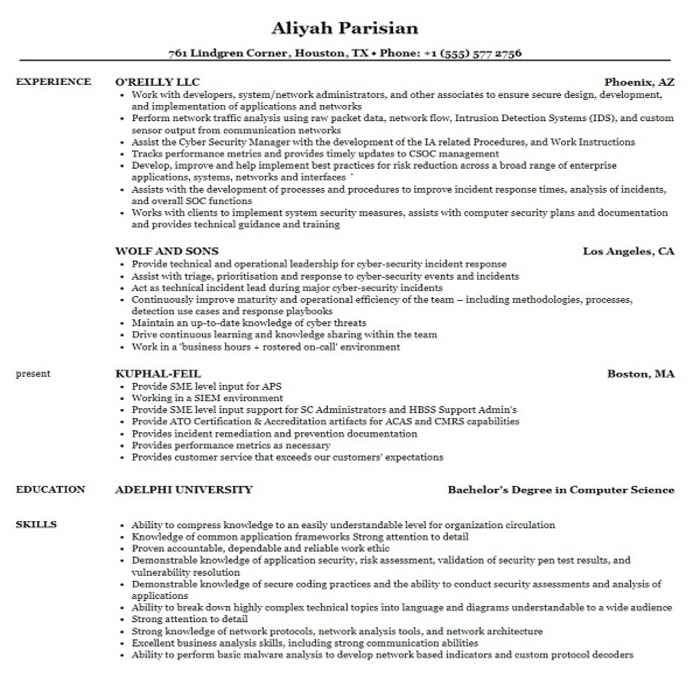
Source: Velvet Jobs
This candidate has created a cybersecurity resume covering all the important details of their work as an analyst. There is mention of experience with both threat analysis and networks, which hiring managers look out for. The only missing element is quantifiable results. The candidate talks about their responsibilities, but not the important part of talking about the results of that work.
The skills section of this resume could have been formatted better. It’s currently a wordy, long list. It would be better to categorize skills as we mentioned earlier and list individual ones under those categories.
You could also write your own, using this cybersecurity analyst resume to guide you:
Cybersecurity Analyst Resume Summary
Cybersecurity Analyst with 5+ years of experience in protecting organizations from cyberattacks and security breaches. Proven ability to identify and mitigate security risks, develop and implement security policies and cyber security audits and respond to security incidents. Expertise in a variety of cybersecurity tools and technologies, including firewalls, intrusion detection systems, and security information and event management (SIEM) systems.
Key Skills and Accomplishments:
- Developed and implemented a new cloud security policy that reduced security incidents by 25%
- Led a team of analysts in investigating and responding to a major security breach, resulting in the recovery of all stolen data
- Managed the implementation of a new SIEM system that improved security visibility by 50%
- Certified Information Systems Security Professional and Security+
Seeking a challenging cybersecurity analyst position in a fast-paced environment where I can use my skills and experience to protect organizations from cyberattacks.
SOC Analyst Resume
What To Include
- The main responsibility of a security operations center analyst is to detect vulnerabilities and mitigate them within data and computer systems. Your resume should demonstrate experience as a cyber security specialist.
- SOC analysts usually work with large teams, so talk about skills that you have in collaborating with cybersecurity engineers and security managers and other cyber security specialists.
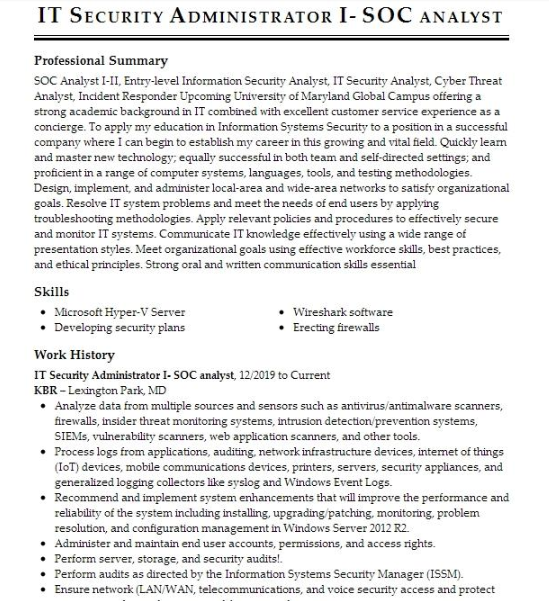
Source: Live Career
This SOC analyst candidate’s cybersecurity resume mentions some of the keywords that you would want to see. There is information about their work in intrusion detection, vulnerability scanners, and network monitoring. These are all important terms to cover in your SOC resume to land a job as a cyber security specialist.
One key change to make in this resume has to do with its structure. This candidate’s work history section comes after the one on their skills. This should never be the case. Always mention your work history first and then go into talking about your education, certifications, and skills.
Information Security Analyst Resume
What To Include
- The main job of an information security analyst is network protection and IT systems defense. Any experience you have in those areas should show up in your cybersecurity resume.
- Include details on how you’ve influenced security policy in your organization. Mentioning how you’ve been associated with new policies shows recruiters that you can go beyond threat detection and lay the groundwork for better preemptive actions as a cyber security engineer.

Source: Kick Resume
This is the cybersecurity resume of an entry-level information security analyst. It demonstrates a clear understanding of the responsibilities of such a role through the mention of network systems, penetration tests, and security evaluations.
The candidate displays additional competence in the field by mentioning how they drafted new policies and procedures for the company. This shows hiring managers that you’re able to go from detecting vulnerabilities to creating procedures to mitigate them.
While this is an entry level resume, a certified information security manager would include a lot more certifications and projects.
The Difference Between a Cyber Security Resume and a Cyber Security Analyst Resume:
- General Cyber Security Resume: Highlights your overall qualifications and experience in cybersecurity, covering areas like network security, information security, and responding to cyber threats. Suitable for various cybersecurity roles.
- Cyber Security Analyst Resume: Specifically tailored for the role of a cybersecurity analyst, focusing on skills and experience directly relevant to the responsibilities of the position. Highlights your ability to analyze threats, assess risks, and respond to security incidents.
How To Stand Out:
- Strategic Formatting: Make your resume scannable. Bold section headings, increase the title text size, italicize subheadings, and bold key points to highlight important information.
- Shining a Light on Job Experience: Order your previous roles in reverse chronological order. For each role, highlight your responsibilities, how you solved problems, and the skills and lessons learned. Connect your experience to the company’s goals and desired results.
- Skills and Education: Get specific with your skills, listing programming languages, malware and antivirus programs, and expertise levels. Include cybersecurity courses, degrees, and certifications in a bulleted list.
What To Avoid:
- Extraneous Information: Avoid padding your resume with irrelevant information. Focus on your cybersecurity experience.
- Excessive Passive Voice: Use the active voice as much as possible. It’s concise and clear.
Where To Find Cybersecurity Resume Templates:
While online templates can provide inspiration, always write your own resume to accurately reflect your skills and the specific job requirements.
Melsoft Academy: Your Path to Cybersecurity Excellence:
Melsoft Academy offers comprehensive cybersecurity training programs, equipping you with the knowledge and skills needed to excel in this dynamic field. Our courses cover a wide range of topics, from fundamental cybersecurity concepts to advanced threat analysis and incident response.
Apply Now to explore our courses and discover how Melsoft Academy can help you build a successful cybersecurity career.

